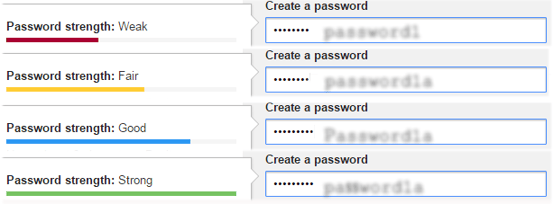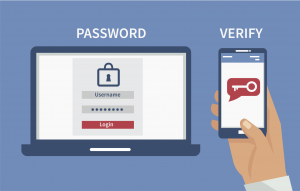2021 has ended with a record-breaking year for data breaches. According to Identity Theft Resource Center (ITRC) research, the total number of data breaches through September 30, 2021, already exceeded the total number of events in 2020 by 17%, with 1,291 breaches in 2021 compared to 1,108 breaches in 2020.
We’re here to review ways for you to stay protected in the New Year!
Change Your Password
Password safety cannot be stressed enough! Changing your passwords every 60-90 days will allow your information to stay protected. With that, your cybersecurity will continue to increase.

Not only will changing your password help, but also make sure it is STRONG. Adding symbols, numbers, and making sure the length is eight or more characters will help keep the password strong. In the example presented above, pa$$word1a has a more muscular password strength than password1 (please don’t use the model above for your next password).
Using a phrase and incorporating shortcut codes and acronyms will keep the password strong while remembering your favorite word or saying. Examples: 2BorNot2B_ThatIsThe? (To be or not to be, that is the question) or ABT2_uz_AMZ! (About to use Amazon). Unique passwords are more complicated to break through than weak and simple passwords (please do not use any examples given above).
When selecting a password, do not use any personal information! Using personal information can lead to hackers knowing the answers to your security questions.
Examples of personal information to not use:
Your name
Age
Date of birth
Child’s name
Pet’s name
Favorite color/song
Don’t Use The Same Password For Everything!
Using the same password for multiple logins will cause a more significant issue than you may think. Having the same password for your banking, company sites, or even for your email will allow hackers to get into multiple accounts rather than just the one they got into.

Having different passwords will increase your cyber security to protect your data. It seems hard at first, but having that variety will allow not only your company's information to stay safe, but your data will continue to stay protected.
Use A Password Manager
A password manager is a program that allows users to store, generate, and manage their passwords for local applications and online services. It assists in generating and retrieving complicated passwords, storing the passwords in an encrypted database, or calculating them on demand.
Having this will alleviate having to write your passwords down on a piece of paper. Writing your passwords on paper or even putting them on a Word/Google document will create an easier passage for hackers to get into your information and cause malicious attacks.
Installing Multi-Factor Authentication

Multi-Factor Authentication is a security technology that requires multiple methods of authentication from independent categories of credentials to verify a user’s identity for a login or other transaction. Having that extra layer of protection will allow your data to be protected while making it difficult for any malicious attacks to happen.
DENY any user that is not you logging in!
Phishing Training
Malicious attacks are happening within your email. Clicking on one bad link could lead to a data breach. Knowing how to identify a phishing scam could not only impact your company data but also your personal information. Phishing training allows you to see simulations of different ways a threat email can come through for you to identify.
Cyber Security Tools
At PCS, we offer cyber security tools to help keep your company and information protected. With Managed Endpoint Protection, Next Generation Antivirus, Advanced E-mail Security, Phishing Training, and Multi-Factor Authentication, it would be a challenge for malicious attacks to happen.
Click here to learn more about PCS.

